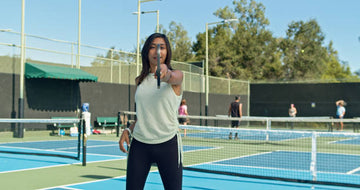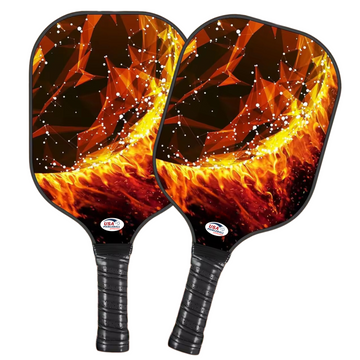A player's mental state significantly impacts their performance in pickleball. It's key to keep a focused mindset to do well in this fast game.
Being able to stay centered under pressure can make all the difference. Players who are mentally tough do better when it counts.
Having a strong mental game is as important as being good physically. When you mix physical skill with mental strength, you get ahead.
Staying cool under pressure starts with the paddle in your hand
Key Takeaways
-
Maintaining a focused mindset is crucial for success in pickleball.
-
A player's mental state significantly impacts their performance.
-
Cultivating mental toughness helps players handle competition stress.
-
A strong mental game is just as important as physical skill.
-
Combining physical and mental resilience gives players a competitive edge.
The Psychology Behind Pickleball Performance
Understanding the psychology of pickleball can really boost a player's game. The mental side of the sport is as crucial as the physical. It shapes how players perform in different situations.
How Mental State Affects Your Game
A player's mental state can greatly impact their pickleball performance. Anxiety, confidence, and focus are key mental factors. They can either help or hinder gameplay.
For example, anxiety can make serving or returning shots tough. But confidence lets players take risks and make bold moves.
The table below shows how different mental states affect a player's game:
|
Mental State |
Impact on Gameplay |
|
Anxiety |
Tense muscles, hesitant decision |
|
Confidence |
Aggressive play, quick decision- making |
|
Focus |
Improved reaction time, strategic play |
The Connection Between Focus and Pickleball Success
Maintaining focus is key for success in pickleball. Players who stay focused can execute strategies better. They also adapt quickly to their opponents' moves.
As Ben Johns, a top pickleball player, said,
"The key to success in pickleball is not just physical ability, but the mental toughness to stay focused and adapt."
To improve focus in pickleball, players can use mental strategies. These include visualization, positive self-talk, and breathing exercises. These strategies can boost mental toughness and performance.
Pickleball and Mental Toughness: How to Stay Focused
To do well in pickleball, players need to stay calm under pressure. Mental toughness is key to success in this fast game. It helps players stay cool, make quick choices, and hit shots well, even when it's tough.
Understanding Mental Toughness in Racket Sports
Mental toughness in sports like pickleball means staying focused, confident, and calm when it counts. It's about being resilient, concentrated, and able to bounce back from setbacks. Players with strong mental toughness handle stress better and keep their game strong, even against tough opponents or during key moments.
Why Focus Is Particular Important in Pickleball
In pickleball, staying focused is crucial because the game moves fast and requires quick actions. A brief distraction can lead to missing a shot or making a mistake, which can cost a point. Players must always be alert and focused on the ball, their opponents, and their own spot on the court.
https://www.youtube.com/watch?v=_SElIY-fTMI
Common Mental Challenges on the Pickleball Court
Pickleball players face many mental hurdles, like feeling the need to win, fearing mistakes, and getting upset over bad calls. These issues can shake a player's confidence and focus, causing their game to suffer. Knowing these challenges is the first step to finding ways to overcome them.
|
Mental Challenge |
Description |
Impact on Game |
|
Pressure to perform |
Feeling the need to win or play |
Tightness, errors |
|
Fear of failure |
Anxiety about making mistakes |
Hesitation, lack of confidence |
|
Frustration |
Anger or disappointment with self or calls |
Loss of focus, aggression |
By knowing these mental challenges, players can start working on strategies to stay focused and keep their mental toughness up during the game.
Pre-Game Mental Preparation Techniques
Mental toughness in pickleball starts before the game. A good pre-game routine is key. It helps players get ready to perform their best. This section will look at ways to improve pre-game mental prep.
Developing a Pre-Game Routine
Having a consistent pre-game routine is vital for pickleball players. It includes physical warm-ups, mental prep, and strategy planning. A routine helps manage nerves and get ready for the game.
A typical routine might include:
-
Physical warm-ups to get moving
-
Mental visualization for positive outcomes
-
Reviewing game strategies and opponent analysis
These elements help players create a routine that keeps them focused and centered.
Visualization Exercises for Pickleball Players
Visualization is a powerful tool for pickleball players. It lets them mentally practice their game and prepare for different scenarios. Visualizing success builds confidence and mental toughness.
"Visualization is the process of creating a mental image or scenario. In sports, it's used to prepare athletes for competition, helping them to anticipate and respond to different situations."
Effective visualization involves:
-
Finding a quiet, comfortable space to focus
-
Closing your eyes and taking deep breaths to relax
-
Visualizing yourself performing well on the court
Setting Intention and Goals Before Matches
Setting clear goals before a match can greatly impact performance. Defining what you want to achieve helps stay focused and motivated.
Set your goals, grab the right paddle, and own the match
|
Goal Type |
Description |
Example |
|
Outcome goals |
Focusing on the result of the match |
Winning the game |
|
Performance goals |
Focusing on specific aspects of performance |
Improving serve accuracy |
|
Process goals |
Focusing on the steps taken during the game |
Maintaining a consistent pre- serve routine |
By using these pre-game mental prep techniques, pickleball players can boost their mental toughness and performance.
On-Court Strategies for Maintaining Focus
Pickleball is fast-paced, requiring players to focus quickly. They must make fast decisions and hit precise shots. This section looks at ways to keep focus during games.
Breathing Techniques During Rallies
Deep, rhythmic breathing is key for staying calm and focused. It helps control heart rate and keeps the mind clear. Breathing exercises can improve focus under pressure.
Between-Point Reset Rituals
Reset rituals are important for staying focused. They can be simple, like deep breathing or adjusting grip. Consistency in these rituals keeps players focused and avoids distractions.
Managing Distractions in a Fast-Paced Game
Handling distractions is crucial in pickleball. Players must deal with crowd noise and opponent chatter.
Handling Crowd Noise and Court Chatter
Players can ignore distractions by focusing on breathing or positive self-talk. This keeps them focused on the game.
Staying Present During Long Matches
To stay focused in long matches, break the game into smaller parts. Focus on one point at a time. This keeps the mind fresh and prevents burnout.
Using these strategies, pickleball players can improve their focus and performance. Techniques like breathing, rituals, and managing distractions are key. With practice, these become natural, helping players stay focused and competitive.
Building Mental Resilience for Competitive Play
Mental resilience starts with preparation—pack smart, play strong with the right pickleball bag.
In competitive pickleball, mental toughness is key. It's not just about skills or fitness. It's about handling mental stress well. Mental resilience helps players recover from setbacks, stay calm under pressure, and keep improving.
Bouncing Back from Mistakes and Bad Calls
Mistakes and bad calls happen in pickleball. How players react to these is crucial. A positive mindset is essential. Players should live in the moment, not dwell on past mistakes.
Techniques like deep breathing and positive self-talk help. They reduce the impact of mistakes, letting players refocus quickly. Also, seeing mistakes as chances to learn helps build resilience and boosts performance.
Maintaining Composure During Critical Points
Match moments can be very intense. Players need to stay calm. Pre-point routines like deep breathing or bouncing the ball help. These calm nerves and keep players focused.
Players should also manage their emotions. Recognize when you're anxious or frustrated. Use techniques like visualization or positive affirmations to stay calm and focused.
Developing a Growth Mindset for Pickleball
A growth mindset is vital for success in pickleball. It means embracing challenges and seeing effort as a way to master skills. Players with this mindset stay motivated and keep improving, even with setbacks.
To grow, players should always be learning. Seek feedback from coaches, peers, or self-analysis. This helps identify areas to improve, enhancing the game and mental toughness.
Conclusion
Having a focused mindset is key for pickleball players who want to get better. The link between pickleball and mental toughness is strong. A strong mental game helps players stay calm under pressure.
Players can use strategies to build mental strength for the game. Techniques like pre-game visualization and breathing exercises help. They also use reset rituals between points to stay focused.
The secret to winning in pickleball is mixing physical skill with mental toughness. By focusing on mental strength, players can outdo their opponents. This leads to better performance on the court.
FAQ
What is mental toughness in pickleball, and why is it important?
Mental toughness in pickleball means staying focused and calm when it matters most. It's key because it affects how well a player does and how they handle stress and pressure.
How can I improve my focus during pickleball games?
To get better at focusing, try a pre-game routine and do visualization exercises. Use breathing techniques during play. Also, set goals before matches and use rituals between points to stay sharp.
What are some common mental challenges faced by pickleball players?
Players often struggle with distractions, crowd noise, and bouncing back from mistakes. To overcome these, build mental strength and use techniques like visualization and positive self-talk.
How can visualization exercises benefit pickleball players?
Visualization helps players mentally prepare by imagining success and staying focused. It boosts confidence, lowers anxiety, and can improve how well you play.
What is the significance of a pre-game routine in pickleball?
A pre-game routine gets players ready, both physically and mentally. It includes stretching, visualization, and positive affirmations. These activities build mental toughness and help focus.
How can players manage distractions during a fast-paced pickleball game?
To handle distractions, stay in the moment and use breathing techniques. Keep a consistent routine between points. This helps you focus on the game and ignore distractions.
What role does mental resilience play in competitive pickleball?
Mental resilience is vital in competitive pickleball. It lets players recover from mistakes and setbacks. It's about learning from failures and staying calm under pressure, key for success.
How can setting intentions and goals improve pickleball performance?
Setting clear goals before matches keeps players focused on what they aim to achieve. It gives direction, boosts motivation, and helps keep concentration high, leading to better play.


